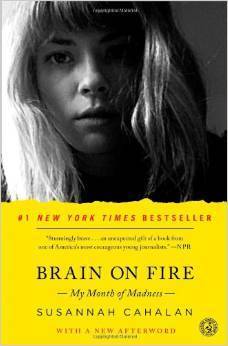There are fleeting moments where I wonder if I’m losing it — like when I pour orange juice into my morning cereal or stash my fiance’s credit card information in the office fridge — moments when I question if I actually have it all together. Those moments are few and infrequent, but as someone who thinks and processes and communicates for a living, I fear the day I’m not in full control of my mental capacities.

That needling fear, however small, may have drawn me to Brain on Fire by Susannah Cahalan when it appeared as recommended reading in my morning news round-up, TheSkimm. “Blacking out is never good. But imagine this: A 24-year-old New York Post reporter wakes up strapped to a hospital bed. No recollection of the entire past month. A true story of a woman’s descent into madness and the rare medical condition that got her there. You won’t be able to look away,” The Skimm warned. I wasn’t able to look away. As Cahalan slid deeper into madness, I whipped through pages faster and faster, maddeningly curious to know the cause of her insanity.
I must warn you that as Cahalan describes her psychosis, her behavior is appalling. She’s rude, she’s excessively nonchalant and she’s hurtful to friends and family. In some portions of the book, I found her intolerable. But the truthfulness of her account also makes the book intriguing. She’s not afraid to air her sordid laundry because it tells the story of her madness. I am often leery of memoirs, knowing many to be a buffed and shiny version of a person’s true smudged life, but Cahalan presents the blemished version unabashedly.
It may be her journalist instincts that lead to such a raw and honest account. In a matter-of-fact way, she is able to turn her reporting skills onto herself. She watches hospital security footage from days when she has no clear memories. She interviews doctors and family members to help piece together days and weeks that have gone dark in her mind. She uses her parents’ shared diary to understand the stress it put on those around her. And from all these sources, she’s able to piece together a coherent narrative of an utterly incoherent experience.
My only complaint was the disappointing quality of reporter Cahalan’s writing. On the other hand, I left pretty confident I wouldn’t go that kind of crazy. One outweighs the other.
Tara Hunt is an associate editor of this magazine.